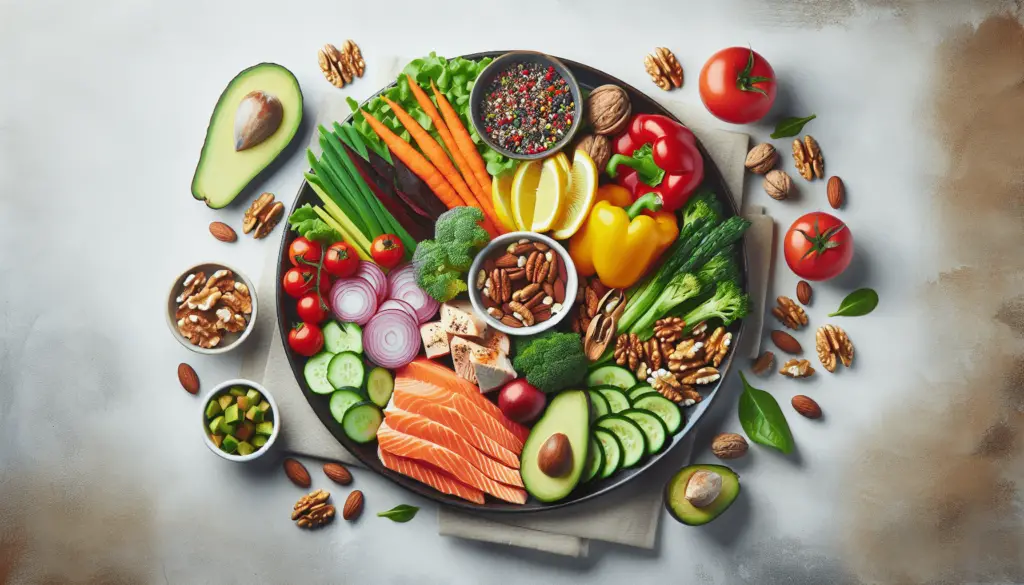In “What Are The Health Benefits Of Following The Atkins Diet Besides Weight Loss?”, you’ll discover that this popular low-carb regimen offers far more than just a slimmer figure. By embracing the Atkins diet, you can potentially enhance your heart health, stabilize blood sugar levels, and even boost your cognitive function. The article delves into how reducing carbohydrate intake can lead to these and other surprising health benefits, making it a holistic approach to improving your overall well-being.
What Are The Health Benefits Of Following The Atkins Diet Besides Weight Loss?
Are you curious about the health benefits of following the Atkins diet beyond shedding those extra pounds? You’re in the right place! While weight loss is often the primary goal for many people who start the Atkins diet, there are several additional health benefits that may tempt you to try this popular low-carb regimen.
In this comprehensive article, we’ll explore the various ways the Atkins diet can enhance your overall health, improve your well-being, and positively affect your body. So, grab a comfy seat and let’s dive into the many perks of the Atkins diet!

Understanding The Atkins Diet
Before we delve into the health benefits, let’s take a moment to understand what the Atkins diet entails. The Atkins diet, developed by Dr. Robert Atkins in the 1970s, is a low-carbohydrate diet designed to help people lose weight and improve their health. It emphasizes protein and healthy fats while significantly reducing carbohydrate intake.
The Four Phases of The Atkins Diet
The Atkins diet is divided into four distinct phases:
- Induction: This is the strictest phase where you limit your daily carb intake to 20-25 grams. It jumpstarts weight loss and sets the stage for long-term habits.
- Balancing: You gradually reintroduce more low-carb vegetables, nuts, and small amounts of fruits. Your daily carb intake increases to 25-50 grams.
- Fine-Tuning: This phase allows further reintroduction of carbs as you get closer to your goal weight. Daily carb intake can range from 50-80 grams.
- Maintenance: You find and maintain your ideal carb balance to keep the weight off, typically 80-100 grams of carbs per day.
Each phase is designed to teach you how to consume healthier foods and maintain a balanced diet that keeps your weight in check.
Health Benefits of The Atkins Diet
Now that we have a solid understanding of the Atkins diet, let’s explore the various health benefits it offers beyond weight loss.
Improved Blood Sugar Control
One of the significant benefits of the Atkins diet is its ability to improve blood sugar control. By reducing carbohydrates, especially refined sugars, you can balance your blood sugar levels more effectively.
Table 1: Effects of Atkins Diet on Blood Sugar Control
| Group | Fasting Blood Sugar Levels | HbA1c Levels |
|---|---|---|
| Before Diet | Elevated | Elevated |
| On Atkins | Stabilized | Lowered |
Studies have shown that people following a low-carb diet like Atkins typically experience reduced fasting blood sugar levels and improved HbA1c levels. This makes it particularly beneficial for individuals with type 2 diabetes or those at risk of developing it.
Enhanced Heart Health
Contrary to the misconception that high-fat diets are bad for your heart, the Atkins diet can actually improve your cardiovascular health.
- Reduced Triglycerides: High carbohydrate intake often results in elevated triglyceride levels. By limiting carbs, the Atkins diet reduces triglycerides, a key factor in heart disease risk.
- Increased HDL (Good) Cholesterol: The Atkins diet can increase your HDL cholesterol, which helps remove bad cholesterol from your bloodstream.
Table 2: Changes in Cholesterol Levels
| Cholesterol Type | Before Atkins | After Atkins |
|---|---|---|
| Triglycerides | High | Lower |
| HDL Cholesterol | Low | Higher |
| LDL Cholesterol | Unchanged/Slight Increase | Moderate Increase |
Although LDL cholesterol (often labeled as bad cholesterol) can increase slightly, the rise is usually in the form of larger, less dense LDL particles, which are less likely to cause heart disease.
Improved Brain Function
Your brain relies on glucose for energy, but it can also use ketones, which are produced during low-carb diets like Atkins. When your body starts burning fat for fuel instead of carbs, it creates these ketones, which many believe can provide a more stable and efficient energy source for your brain.
Researchers are increasingly interested in the potential neuroprotective effects of ketones, particularly for conditions like Alzheimer’s and Parkinson’s. Individuals on the Atkins diet may experience:
- Enhanced Mental Clarity: Many people report improved focus and mental clarity when following a low-carb diet.
- Stabilized Mood: Fluctuations in blood sugar can affect your mood. By stabilizing your blood sugar, the Atkins diet may help maintain a more balanced mood.
Reduced Inflammation
Chronic inflammation is a silent enemy that contributes to various health issues, including heart disease, cancer, and arthritis. The Atkins diet can help reduce this inflammation in several ways:
- Lowering Sugar Intake: Refined sugars and carbs are known to promote inflammation. By cutting these out, you can help reduce your body’s inflammatory response.
- Increasing Omega-3 Intake: The Atkins diet encourages the consumption of fatty fish and other omega-3-rich foods, which have anti-inflammatory properties.
A diet rich in healthy fats and low in carbs can help manage chronic inflammation, improving your overall well-being.
Better Digestive Health
Switching to the Atkins diet can improve your digestive health. Here’s how:
- Improved Gut Flora: Consuming more fiber-rich vegetables can promote a healthy balance of gut bacteria.
- Reduced Bloating: High-carb and processed food can lead to bloating and digestive discomfort. A low-carb diet like Atkins can alleviate these symptoms.
Enhanced Metabolic Health
Your metabolism plays a crucial role in maintaining your weight and overall health. The Atkins diet encourages your body to use fat for energy, which can enhance metabolic efficiency. Here are some key benefits:
- Increased Fat Burning: When you limit carbs, your body turns to fat as its primary energy source, making you more efficient at burning fat.
- Reduced Insulin Levels: High-carb diets can spike insulin levels, leading to insulin resistance and metabolic issues. The Atkins diet helps promote more stable insulin levels.
Better Skin Health
Believe it or not, the Atkins diet can also benefit your skin. A diet high in sugar and processed foods can lead to skin issues like acne, inflammation, and premature aging.
- Reduced Acne: By cutting down on refined carbs and sugar, you may see a reduction in acne and other skin conditions.
- Increased Hydration: The Atkins diet encourages drinking plenty of water, which is essential for skin hydration and health.
Enhanced Energy Levels
Many people report increased energy levels when following the Atkins diet. This boost in energy can be attributed to the more stable blood sugar levels and the body’s efficient use of fat for fuel.
- Stable Energy: Unlike diets high in refined carbs, which can cause energy crashes, the Atkins diet provides a more stable energy source.
- Improved Endurance: Athletes and active individuals may experience improved endurance from the steady energy supply.
Longer Satiety and Reduced Cravings
One of the struggles with most diets is feeling hungry most of the time. The Atkins diet can help with:
- Reduced Appetite: Protein and healthy fats are known to be more satiating than carbs, helping you stay full longer.
- Fewer Cravings: Cravings often result from blood sugar spikes and crashes. The Atkins diet’s focus on stable blood sugar helps reduce these cravings.
Potential Cancer Prevention
Some research suggests that a low-carb diet may help reduce the risk of certain cancers. Cancer cells primarily thrive on glucose, and by reducing your carb intake, you may be able to starve cancer cells, slowing their growth and potentially preventing cancer development.
- Reduced Insulin Levels: High insulin levels can promote the growth of some types of cancer. The Atkins diet’s ability to stabilize insulin levels can reduce this risk.
- Improved Immune Function: A healthy, balanced diet supports a robust immune system, which is crucial for cancer prevention.
Hormonal Balance
Hormones play a vital role in your overall health, affecting everything from mood and energy levels to weight and reproductive health. The Atkins diet can help balance your hormones in several ways:
- Reduced Insulin Levels: High-carb diets can lead to insulin resistance and hormonal imbalances. The Atkins diet helps stabilize insulin levels.
- Improved Thyroid Function: Some studies suggest that low-carb diets can improve thyroid function, supporting a healthy metabolism.
- Enhanced Reproductive Health: Balanced hormones can improve reproductive health, enhancing fertility and reducing symptoms of hormonal disorders like PCOS.

Criticisms and Considerations of The Atkins Diet
While the Atkins diet has many benefits, it’s not for everyone. It’s essential to consider these potential drawbacks before deciding if it’s right for you.
Nutrient Deficiency Risks
Eliminating certain food groups can lead to nutrient deficiencies if you’re not careful. Ensure you’re getting a variety of vegetables, fruits, and whole foods to avoid lacking essential vitamins and minerals.
Keto Flu and Adjustment Period
Many people experience what’s commonly known as the “keto flu” during the initial phases of the Atkins diet. This can include symptoms like headaches, fatigue, and irritability as your body adjusts to using fat for fuel.
Sustainability
The strict carb restrictions can be challenging to maintain long-term. It’s important to find a balance that works for your lifestyle to ensure you can sustain the diet.
Possible Increased LDL Cholesterol
Although the Atkins diet can improve many aspects of heart health, it can also increase LDL cholesterol levels in some people. Regular monitoring and consulting with a healthcare professional are advised.

Making the Atkins Diet Work for You
If you decide to give the Atkins diet a try, here are a few tips to help you succeed:
Plan Your Meals
Planning and prepping your meals can help you stick to the diet, especially during the initial phases.
Stay Hydrated
Drinking plenty of water is crucial, particularly as you increase your intake of protein and healthy fats.
Monitor Your Health
Regular check-ups and blood tests can help you monitor your progress and ensure you’re not developing any nutrient deficiencies.
Listen to Your Body
Every person is different. Pay attention to your body’s responses and make adjustments as needed. If you experience any adverse effects, consult a healthcare professional.

Conclusion
So, what are the health benefits of following the Atkins diet besides weight loss? As you’ve discovered, the Atkins diet offers a plethora of advantages beyond just shedding those extra pounds. From improved blood sugar control and heart health to enhanced brain function and reduced inflammation, this low-carb diet can have a significant positive impact on your overall well-being.
Whether you’re looking to stabilize your energy levels, balance your hormones, or even reduce your risk of chronic diseases, the Atkins diet provides a comprehensive approach to achieving better health. Remember, it’s essential to personalize the diet to fit your lifestyle and consult with healthcare professionals as needed.
Ready to reap the manifold benefits of the Atkins diet? Give it a try and experience the transformation for yourself! Here’s to a healthier, happier you without the added weight.






